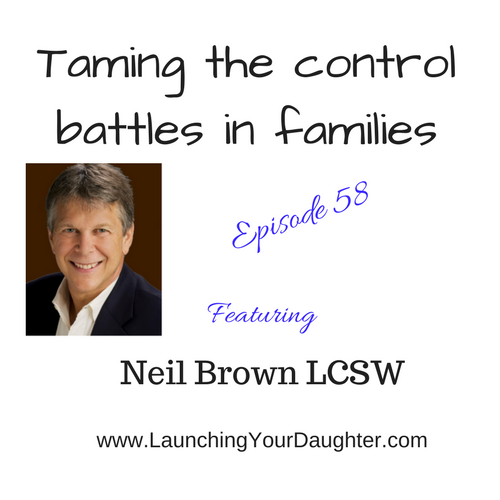<iframe style="border: none" src="//html5-player.libsyn.com/embed/episode/id/5419818/height/90/theme/custom/autoplay/no/autonext/no/thumbnail/yes/preload/no/no_addthis/no/direction/backward/render-playlist/no/custom-color/390975/" height="90" width="100%" scrolling="no" allowfullscreen webkitallowfullscreen mozallowfullscreen oallowfullscreen msallowfullscreen></iframe>

My guest today is Neil Brown a licensed clinical social worker, author, and podcaster. He is located in the beautiful area of Santa Cruz, CA. Neil has over 40 years of clinical experience, comes from a systemic approach and works with families and couples and kids of every age. In today’s episode, we are going to explore some areas in his recent book called Ending the Parent-Teen Control Battle. His book is written for parents of middle to high school age teens.
In this episode you will learn:
- What is a control battle?
- What are the developmental stages in adolescents?
- Taming the Beast
Neil’s Journey
- Neil shares his professional journey in working with families
- Worked with Salvador Minuchin in structural family therapy
- He shares how this book began as a presentation, had some roadblocks and continued to persevere his dream.
What are the developmental stages in adolescents:
- Footbridge connects the land of childhood and land of adulthood
- Early Adolescent – push away from family and toward teenager
- Can vacillate between still being child and moving away from parents
- Middle Adolescents (15 yr old)-quintessential teenager, angst, drama, not afraid of young adulthood, can make a lot of mistakes at this age
- Late Adolescents (around 16 yrs old)-begin to think about moving out of home, motivation is preparing for next stage of life
- Neurology of teenager different than child or adult
[spp-tweet tweet=”“Teens become specialists in where they put their time and energy” Neil Brown LCSW”]
Taming the Beast:
- Relationship patterns that become stuck or rigid
- Exploring the negative pattern and how each family member participates in the pattern
- Encourages parents and teen to work together in “starving the beast”
- Stop trying to change your teenager
- Communicating your faith in them and supportive language
- Earning privileges vs consequences-being accountable and taking responsibility
- [spp-tweet tweet=”“Trust is the currency for their (teenager) independence””]
- Parents can validate their daughter’s choices through listening, giving specific feedback
- Improves self-esteem and confidence
- Research shows children respond better to rewards vs punishment
Avoiding parental burnout:
- Parents putting a lot of effort into something that is failing (power struggles) and can burn out
- Pay attention to the signs of possible burnout
- Parental nourishment – support, ‘me’ time, self-care
- Embracing what makes you a unique parent and being happy with yourself
Neil’s Information
His Book (affiliate link)
[spp-optin]
